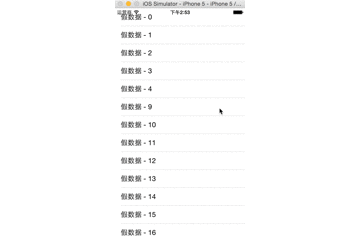Swift之UITableView的使用
Swift和OC中UITableView的使用基本是差不多,只是有一些语法上的差异。下面我们一步一步从0开始写一个tableView。
一、创建tableView
import UIKit let ID = "Cell" //cell的ID,建议像这样写一个常量,不要直接使用"Cell" class ViewController: UIViewController, UITableViewDataSource, UITableViewDelegate { //0.遵守协议 override func viewDidLoad() { super.viewDidLoad() //1.创建UITableView(跟OC几乎一样) var tableView = UITableView(frame: view.bounds, style: UITableViewStyle.Plain) //2.注册Cell tableView.registerClass(UITableViewCell.self, forCellReuseIdentifier: ID) //下面这种写法也是可以的 //tableView.registerClass(UITableViewCell.classForCoder(), forCellReuseIdentifier: ID) //3.设置数据源和代理 tableView.dataSource = self tableView.delegate = self; //4.添加到view中 self.view.addSubview(tableView) } }
注意 :1.协议的写法,不需要写<>。2.上面的代码中第0步和第3步会报错,不要惊慌,暂时无视,并不是代码有问题,是因为我们没有实现相应的协议方法。
二、准备假数据
// 懒加载 lazy var datas: [Int] = { // 创建一个存放int的数组 var nums = [Int]() // 添加数据 for i in 0...50 { nums.append(i) } // 返回 return nums }()
这里采用懒加载,Swift的懒加载和OC差别还是比较大的,需要注意一下。
三、实现协议方法
// MARK: - UITableViewDataSource & UITableViewDelegate func tableView(tableView: UITableView, numberOfRowsInSection section: Int) -> Int { //返回有多少行Cell, 这里返回数组的count return datas.count } func tableView(tableView: UITableView, cellForRowAtIndexPath indexPath: NSIndexPath) -> UITableViewCell { // 获得cell let cell = tableView.dequeueReusableCellWithIdentifier(ID, forIndexPath: indexPath) as! UITableViewCell // 配置cell cell.textLabel!.text = "假数据 - /(datas[indexPath.row])" // 返回cell return cell }
解释几个可能有点迷糊的地方:
1.as:这个东西比较符合人类思维,给苹果点个赞。意思就是 把什么当作什么 ,在上面的代码中,由于方法dequeueReusableCellWithIdentifier的返回值是
AnyObject(也就是OC中的id类型),所以需要通过as告诉编译器这实际上是一个UITableViewCell。
2.!(感叹号):这玩意就是告诉编译器我确定这里的的cell.textLabel一定是非nil的, 可以放心的执行后面的。as后面的!也是一样的道理。
至此,可以编译运行看看效果了.

四、增加左滑删除功能
实现一个方法即可
// 提交编辑操作 func tableView(tableView: UITableView, commitEditingStyle editingStyle: UITableViewCellEditingStyle,
forRowAtIndexPath indexPath: NSIndexPath) { // 如果是删除操作 if editingStyle == .Delete { // 从数组中移除对应位置的数据 datas.removeAtIndex(indexPath.row) // 删除表格中对应行的数据 tableView.deleteRowsAtIndexPaths([indexPath], withRowAnimation: UITableViewRowAnimation.Fade) } }
大功告成,运行看看效果吧。祝大家生活愉快!

正文到此结束
热门推荐
相关文章
Loading...










![[HBLOG]公众号](https://www.liuhaihua.cn/img/qrcode_gzh.jpg)

